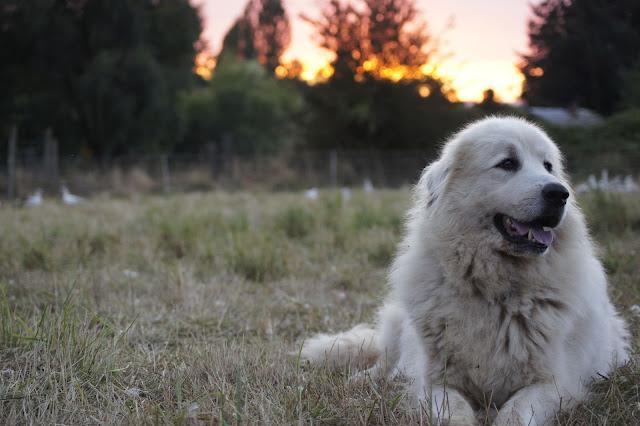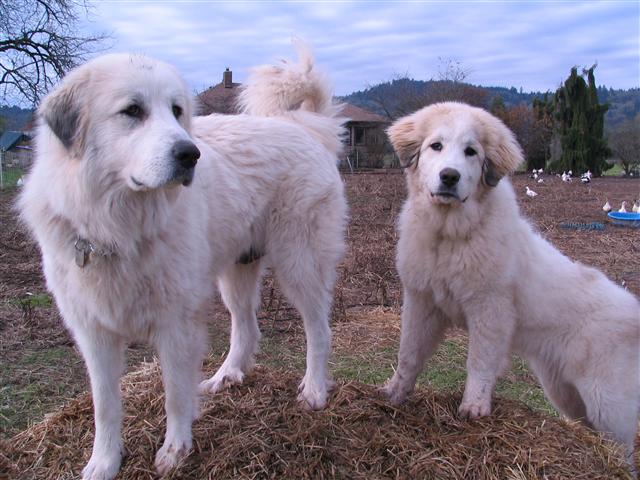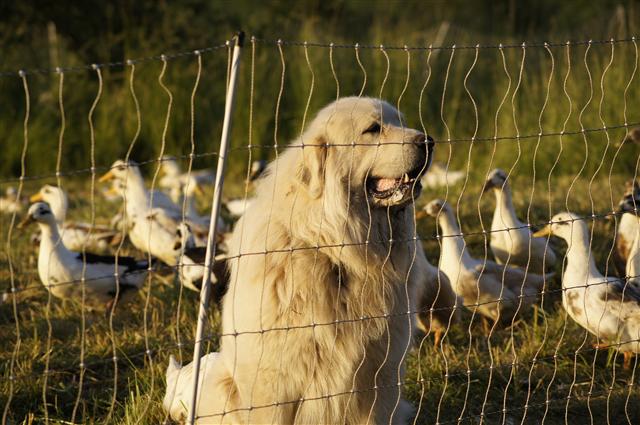Great Pyrenees
AKC Registered Livestock Guardian Dogs
We DO have a litter currently as of July 1st, 2015.
We have a few pups left, please fill out the puppy screening questions tab above and email to
boondockers at live.com
Jori, "Earthworker"


 Amalie "industrious, striving; working"
Amalie "industrious, striving; working"
"The three qualities most sought after in livestock guardian dogs are
trustworthiness, attentiveness and protectiveness—"
By: Linda Escobedo
The livestock raised at Boondockers farm consists of a flock of 1000 breeding Ancona ducks representing the main genetic stock of the breed. Ducklings are hatched and sold throughout the United States and Canada. The rarity of these ducks and the farms purpose puts and incredible amount of responsibility on the farms great Pyrenees as livestock guardians. The goal of this farm is to bring the Ancona duck breed out of the critical category.
 The great Pyrenees have been used at this farm for the past 2-3 years. Prior to using the great Pyrenees as livestock guardian the birds were locked up at night. The farm is located just outside the city lines and has a large number of raccoons, opossum, hawks and vultures. Prior to using the great Pyrenees as livestock guardian several livestock losses occurred. The first pair of ducks were attacked by a raccoon just after they were let out of their house at dusk. A female quacking was heard and the owners ran outside as a raccoonwas dragging the female duck away. The duck had many puncture wounds which were bleeding heavily as well as her nasal cavity and part of her bill destroyed but she was alive. She was stitched up and healed completely. After that occurrence the ducks were locked away earlier and let out later. A couple of years later the farm rescued a Muscovy duck who wasn't part of the flock and was not tame. This duck could not be locked away with the farms ducks for those reasons and on the second morning she was found dead and partially eaten by raccoons. Prior to this incident awareness that raccoons were in the area was not realized. After this occurrence raccoons then started coming back almost nightly. They would be chased away with flashlights and a bb gun.
The great Pyrenees have been used at this farm for the past 2-3 years. Prior to using the great Pyrenees as livestock guardian the birds were locked up at night. The farm is located just outside the city lines and has a large number of raccoons, opossum, hawks and vultures. Prior to using the great Pyrenees as livestock guardian several livestock losses occurred. The first pair of ducks were attacked by a raccoon just after they were let out of their house at dusk. A female quacking was heard and the owners ran outside as a raccoonwas dragging the female duck away. The duck had many puncture wounds which were bleeding heavily as well as her nasal cavity and part of her bill destroyed but she was alive. She was stitched up and healed completely. After that occurrence the ducks were locked away earlier and let out later. A couple of years later the farm rescued a Muscovy duck who wasn't part of the flock and was not tame. This duck could not be locked away with the farms ducks for those reasons and on the second morning she was found dead and partially eaten by raccoons. Prior to this incident awareness that raccoons were in the area was not realized. After this occurrence raccoons then started coming back almost nightly. They would be chased away with flashlights and a bb gun. 
After the first attack, Great Pyrenees were considered as livestock guardians for the farm, but not until after the second attack were great Pyrenees brought onto the farm. The first day using the great Pyrenees as livestock guardian with the ducks proved to be amazingly successful. All predators were kept out of the duck area, and this was by a two month old great Pyrenees puppy! The female is the alpha dog, however when the dogs are separated the male takes charge. Different roles are noticed between the female and male great Pyrenees on this farm. The female is active by patrolling and barking frequently during the night with the male backing her up when required. The female tends to sleep during the day and the male takes more of the livestock guarding at this time. The two dogs act as a team and when they are separated both act independently in their guardian duties. The female does tend to herd the ducks together when she is worried and is very protective. Both dogs are calm and careful to not scare or run over the ducks. The dogs are taught to not walk thru the ducks by the owners using a buzzer type noise if they do. The great Pyrenees are taught to let the ducks pass and not to disturb them. 
No great Pyrenees has been lost to predators on this farm. At the farms prior location neighbors were losing cows to cougars. The farm moved to a new location. At the farms present location the predators are bears, cougars, foxes, raccoons, rats, feral cats and dogs, snakes (that steal baby ducklings and eggs), skunks, bobcats and many types of aerial predators. Crows as aerial predators were stealing a majority of the duck eggs until the dogs were taught to chase them off. The cougars in the area routinely come onto this farmand take deer off the property. Even with this high population of predators, livestock losses under the great Pyrenees has been minimal. One duck was lost in broad daylight inside the fenceline possibly from a skunk. The reaction of the dogs when predators are in the area are different. One male gets his deep bark going that sounds "growly" and gluteral which sounds angry and intimidating. The other dog begins howling. The dogs also put their tail up into the air and take on a different alert stance. If they can see the predator they will run angrily along the fence line. If it is a small predator the dogs are more playful with their guarding, the same with aerial predators, they seem to find it fun. The owner can tell when the dogs are unsure or if the predator is large. The female is also very good at throwing her voice and usually does it much of the night so it sounds like multiple dogs in multiple areas.
This farm uses a mobile electrified netting called PoultryNet by Premier 1 (48”). One dog can jump it from a standing position. This type of electric fencing is effective in stopping predators on the ground, but aerial predators can still pose risk to the ducks and the raccoons are able to climb in from a forest branch with its forest type setting. The great Pyrenees have respect for this type of fence and the puppies by two months of age respect the fence as well. One dog is able to tell if the electric fence is off or on and shows the owner he knows by touching his nose to it. The great Pyrenees at this farm do not roam but they do dig. They dig themselves beds in the dirt and sometimes the dogs dig for fun, but never to get out and roam.
The great Pyrenees on this farm are fed various types of food and the amount varies depending on if they are adult dogs, pregnant females, nursing females or puppies. One of the types of food fed is a grain free kibble. Raw meat and bones in whole or large pieces along with organ meats are also supplemented with the kibble. The puppies, pregnant females and nursing females are given more supplements such as this
and are also given milk, cultured buttermilk or yogurt. This keeps the puppies and pregnant/nursing females healthy and when the nursing mothers milk dries up she gets gains weight quickly with this type of diet. The amount of kibble given is approximately a coffee can full but varies depending upon the weight of each dog, puppy status, etc. The owners go by each dogs condition to judge the amount each dog needs. The dogs are also given Diatomaceous Earth made into a milkshake consistency with milk and this is how the dogs and puppies are wormed. When the great Pyrenees eat, they are fed out in the pastures or fields. The ducks really love the kibble and come running when the dogs are fed. To avoid the ducks eating the dogs food a 5 gal bucket ¼ way filled with kibble is used so the ducks cannot get to it. The owners prefer to feed the dogs in the evening because the ducks are not as active during this time of day, however this time of day is when the predators are becoming more active so different times of the day are used. The owners rationale for feeding their working dogs in the pasture is they would not want to feed the dogs anywhere else because it seems they would associate leaving their flock with getting food. That could lead to finding the working dogs on your doorstep when they are hungry. Who then would be guarding the ducks?
 Boondockers farm does their own vaccinations for their dogs and puppies and the vet administers the rabies vaccine. The vaccinations are ordered separately, not as a cocktail mixture. This farm is very conscious of bio-security and the owners feel it is safer to bring their dogs into the vet rather than having the vet bring his truck into their pastures which could bring diseases from another farm. When taking the dogs to the vet, they check in first, wait in the adjacent parking lot, and have the vet call them when the room is cleaned and the vet is ready. The room closest to the entrance is used and the dogs are carried in and placed on a clean table. This avoids the dogs paws from picking up contaminants possibly at the vet's office. For flea removal and control, the dogs are bathed with a shampoo consisting of rosemary, lemongrass, lemon, geranium and chamomile. If the fleas are persistent, this method is alternated with cedar, eucalyptus or peppermint. This farm is located in a wet climate resulting in the dogs feet getting soggy which can lead to sores on the feet. When this happens the dogs paws are treated by dipping their feet in a mild cider and chamomile oil. For worming, once a month Diatomaceous Earth (DE) mixed with raw milk is used. Boondockers farm estimates the food bill for each dog to be approximately one hundred dollars per year, but can be less (or free) during hunting season, certain harvest times or when a farmer friend has an injured or old animal who needs to go to the butcher.
Boondockers farm does their own vaccinations for their dogs and puppies and the vet administers the rabies vaccine. The vaccinations are ordered separately, not as a cocktail mixture. This farm is very conscious of bio-security and the owners feel it is safer to bring their dogs into the vet rather than having the vet bring his truck into their pastures which could bring diseases from another farm. When taking the dogs to the vet, they check in first, wait in the adjacent parking lot, and have the vet call them when the room is cleaned and the vet is ready. The room closest to the entrance is used and the dogs are carried in and placed on a clean table. This avoids the dogs paws from picking up contaminants possibly at the vet's office. For flea removal and control, the dogs are bathed with a shampoo consisting of rosemary, lemongrass, lemon, geranium and chamomile. If the fleas are persistent, this method is alternated with cedar, eucalyptus or peppermint. This farm is located in a wet climate resulting in the dogs feet getting soggy which can lead to sores on the feet. When this happens the dogs paws are treated by dipping their feet in a mild cider and chamomile oil. For worming, once a month Diatomaceous Earth (DE) mixed with raw milk is used. Boondockers farm estimates the food bill for each dog to be approximately one hundred dollars per year, but can be less (or free) during hunting season, certain harvest times or when a farmer friend has an injured or old animal who needs to go to the butcher.
When asked if this farm handles or pets their great Pyrenees the answer was yes. Furthermore, the owners explained that a bond between the great Pyrenees and its owners is needed for a mutual understanding for the dog to know what is expected of it and for them to have loyalty. The better you can communicate with your working dogs the better you can explain what it is you want them to do. They need to trust you and you need to give them reason to have that trust.
The great Pyrenees are introduced to their duck flock in a very specific way. When the dogs are brought onto the property from other farms they are immediately taken on perimeter walks and checks. The dogs are encouraged to sniff, especially where known predators have been and they are praised when they follow the scent. The owners mimic the behaviors they want their dogs to exhibit. They get down and sniff with the dogs. The owners also show lots of affection and protectiveness towards the ducks so the dogs understand that they are greatly valued. The dogs start out in a pen in the middle of the yard with supervision and then they graduate to a lead rope. They are watched carefully and praised or reprimanded to reinforce the correct behaviors. The owners will hold a duck and talk nicely to it while demanding the dog lie down and keep their head down, or make them lie on their side-rolled over, basically requiring a submissiveness to the duck. Praise is always given for the dogs correct behaviors. The dog will soon learn that they can get a better look and sniff if they let the ducks approach them. Since aerial predators are such a threat to ducks and their eggs, the owners also train their great Pyrenees for aerial protection. The dogs are taught to see and chase aerial predators by throwing a football into the air for them to attack while the owners are shouting “look up” The ducks also have a role in this training. The ducks see many things in the sky so far up that humans cannot see it. When the ducks see a predator in the sky the male duck will sound the alarm and the flock will all tilt their heads to watch the flying bird, sometimes while running for cover. The great Pyrenees now knows what this means, but if the dog does not notice or see anything the cue “look up” will be shouted and the dog will look for it. So the aerial training comes from both active training by the owners as well as taking a cue from the male duck alarm. Puppies are trained differently. Before three months of age the puppy is pretty harmless to the ducks and are placed directly in with the ducks. After 3 months of age they are placed with the ducks as often as they can be supervised and the previous training described takes place. The puppies are placed with the ducks full time at around seven months of age. This farm has not retired any great Pyrenees yet because they are all still young dogs.

When asked what the pro's and con's were to utilizing the great Pyrenees as livestock guardians Boondockers farm listed the pro's as their dogs know their ducks. The know their language and cue off of them. Also the predators permanently respect the livestock territory of the large great Pyrenees more than anything else. The dogs also communicates with the owners. The dogs are even able to show the owners where the predators are coming from. The con's are that training can incur losses if the owners are not attentive enough. The great Pyrenees needs to understand not only to protect the ducks but to not trample them accidentally, which can be especially difficult when they are chasing aerial predators. Ducks need protected areas they can run to in case of danger so the great Pyrenees can do their job effectively around them. These con's are really not a big deal considering how difficult it is to protect ducks from predators by any other means.
Concerning herding abilities, the female great Pyrenees is very protective of her ducks and may herd them if she needs to put them somewhere when threatened by predators. Boondockers farm revealed that their great Pyrenees have somewhat taken to guarding neighboring pastures in the past, one with sheep and one with chickens. One neighboring pasture with the sheep had lost around 7 sheep per year taken by cougars. The sheep began to sleep along the fence line closest to the ducks netting and where the great Pyrenees were. When predators were in the area, the dogs would bark until they left. One of the males in particular had been a livestock guardian to sheep prior to coming to Boondockers farm, and this male considered the sheep in the neighboring pasture, his livestock as well.